Table of Contents
If you’re spending time with people who are still looking for ways to become the best version of themselves, you’ve probably heard something about adaptogens. These are plants and fungi that contain antioxidants and other active substances that support mental resilience and stress management. In short, adaptogenic substances will help you better cope with stress and adapt to it. Adaptation then involves adapting to external conditions and protecting the organism from negative influences.
In addition, positive effects on brain activity, intestinal microbiome and immunity have been observed with adaptogenic agents. If you manage to improve some of these areas, you can improve your overall life. Therefore, adaptogens have recently gone through a wave of popularity. In this article, you will learn which ones are among the most effective, what they can improve and how they are used.
What are adaptogens and how do they work?
Thanks to their properties, adaptogens are especially popular among biohackers, students and all people who are looking for natural ways to manage stress better. These are various herbs and mushrooms that have been processed into powder, tinctures, tablets or capsules. This is nothing new, although there is more talk about them recently. Adaptogens are a common part of traditional Chinese medicine and Ayurveda. Even pilots during World War II used them as a tool for better stress management. [1]
Adaptogens work by supporting the body’s natural resistance to stress. They can strengthen the mechanisms that help to cope with higher workload, adjust and ultimately adapt to stress and survive. By using adaptogens, you will train your system similarly to the muscles in the gym. You can think of stress as a heavy barbell. At the beginning, you can barely do a few reps. But if you train with it regularly, your muscles will strengthen and in time it will not be so difficult for you. Just as your muscles have adapted to the workload, adaptogens will boost your resistance to stress.
Each adaptogen has a slightly different effect and affects different bodily functions. According to research, these substances can activate various mechanisms that regulate hormone levels, affect energy production or provide some degree of protection against certain diseases. These mechanisms, in turn, support the overall health of the organism and its ability to survive. [2–4]
But that certainly does not mean that you can just take adaptogens and expect them to protect you from all the pitfalls of the modern world. Unfortunately, it doesn’t work like that. To stay healthy, regular exercise, a healthy diet containing all the important nutrients, adequate rest and also overall mental health care are still the most important. Take adaptogens as another piece of the puzzle of a healthy lifestyle that can help improve the quality of your life. To get the most out of them, make sure that you use them regularly and long-term. It can take up to several weeks for their effects to start appearing. [2–4]

1. Rhodiola rosea helps to manage stress and reduce fatigue
Rhodiola rosea, or “arctic root”, also known as the golden root, is a plant that occurs mainly in colder mountain areas. It does not only have a noble name, but it also has a wide range of effects, thanks to more than 140 active substances contained in it. Rosavin and salidroside are considered to be the most effective. The extract from this plant is most often used in the form of tablets, tinctures or capsules. Its effects have been known for many years to the inhabitants of China and also to some areas of Russia and Scandinavia, as it can be helpful with, for example, demanding climatic conditions. [5]
Effects of Rhodiola rosea according to studies
Rhodiola rosea is most often used to reduce fatigue and exhaustion, improve cognitive function, attention and subjective feeling of mental well-being, led by a reduction in the level of perceived stress. It can also have a positive effect on sports performance.
Behind these effects are a number of mechanisms which affect the human body. According to studies, it can affect hormone levels, for example normalising the amount of the stress hormone cortisol. In large amounts in the blood, cortisol can cause feelings of anxiety, tension, irritability and insomnia. Rhodiola can help you prevent these symptoms and better manage stressful situations. [5]

Researchers who have observed the effects of Rhodiola rosea extract have also found that it helps restore cellular energy in the form of ATP. This could explain its effect in reducing fatigue. Interesting results were also obtained in a study in which participants with chronic fatigue received 400 mg of Rhodiola extract daily. After 8 weeks of regular use, they had more physical and mental energy. They also had better sleep, decision-making skills and felt less stressed. [6–7]
Another study examined the effect of this adaptogen on cyclist performance. One hour before riding the bicycle, one group was given a single dose of 3 mg of Rhodiola extract per 1 kg of body weight. The second group received placebo in the form of carbohydrates. During further testing, the groups were swapped. Cyclists who used Rhodiola before the test ride had a lower heart rate, covered the distance faster, and felt they didn’t have to put as much effort into the same performance as without it. All this can lead to overall better sports performance. Rhodiola rosea can thus contribute to the improvement of many aspects of everyday life. [6–7]
Recommended dosage of Rhodiola rosea
- When choosing a dietary supplement containing Rhodiola, choose those that contain a standardized extract containing 3% rosavin and 1% salidrosides.
- Doses of 50 to 600 mg per day are commonly used in studies.
- However, higher doses (typically exceeding 680 mg per day) are no longer recommended. As with most things, the more the better does not really apply to the effects of adaptogen.
- To achieve the desired effects, it is necessary to use the “golden root” long-term. [5]
It is also important to get enough rest to prevent physical and mental fatigue. This includes sleep and other activities that help you relax. To learn more about it, read our article What To Do If You Feel Tired After Sleeping? Focus on These Types of Rest.
You might be interested in these products:
2. Ginseng supports the nervous system and health in men
Asian ginseng (Panax ginseng) is a plant that occurs mainly in Asia and Russia. Its use also has the greatest tradition in this area. It is considered to be the strongest adaptogen of all. The effects of this plant are probably also the most researched. If you ever see it, it will probably attract you with its dark red fruits. However, its main strength lies underground because ginseng root extract is mainly used for the production of food supplements. Therefore, roots are the place where the strength of ginseng is hidden. This adaptogen has some really unique properties. [8]
Effects of ginseng according to studies
Ginseng can offer a really diverse range of beneficial effects. These include improving mood, immune and cognitive functions, as well as promoting health in men by regulating testosterone levels and erectile function. At the same time, it has a positive effect on the nervous system and sports performance.
A number of studies have confirmed that it supports the normal function of nerves and protects them from damage. This helps to prevent, for example, Alzheimer’s or Parkinson’s disease. Ginseng is also often used to support brain function. It affects the activity of choline, which is important for the production of acetylcholine – a neurotransmitter that has an important role in the regulation of memory, thinking and learning. [9]
It also increases the activity of the body’s antioxidant glutathione peroxidase, which can scavenge harmful free radicals and thus protect cells from oxidative stress. It also affects the production of nitric oxide, which increases blood flow. As a result, it supports the proper function of the heart and blood vessels, and the supply of oxygen and important nutrients throughout the body. For example, as part of studies, men were given ginseng supplements. As a result, there was reported an improvement in erectile function, which is thanks to better blood circulation. In addition, the results of scientific work suggest that this adaptogen can alleviate some of the symptoms of menopause in women, and thus promote libido. [10–11]
Recommended dosage of ginseng
- In the studies, 100 to 800 mg of ginseng extract was commonly administered.
- The effective dose is in the range of 500-2000 mg of dried powder.
- To promote male sexual health, it is recommended to use Korean red ginseng in an amount of 1000 mg 3 times a day
- The effects typically appear after long-term use. [11]
In addition to ginseng, nootropics also help support brain functions. If you are interested in how these substances work and which are the most effective, read our article Nootropics To Improve Brain and Memory Functions That You Need To Know.
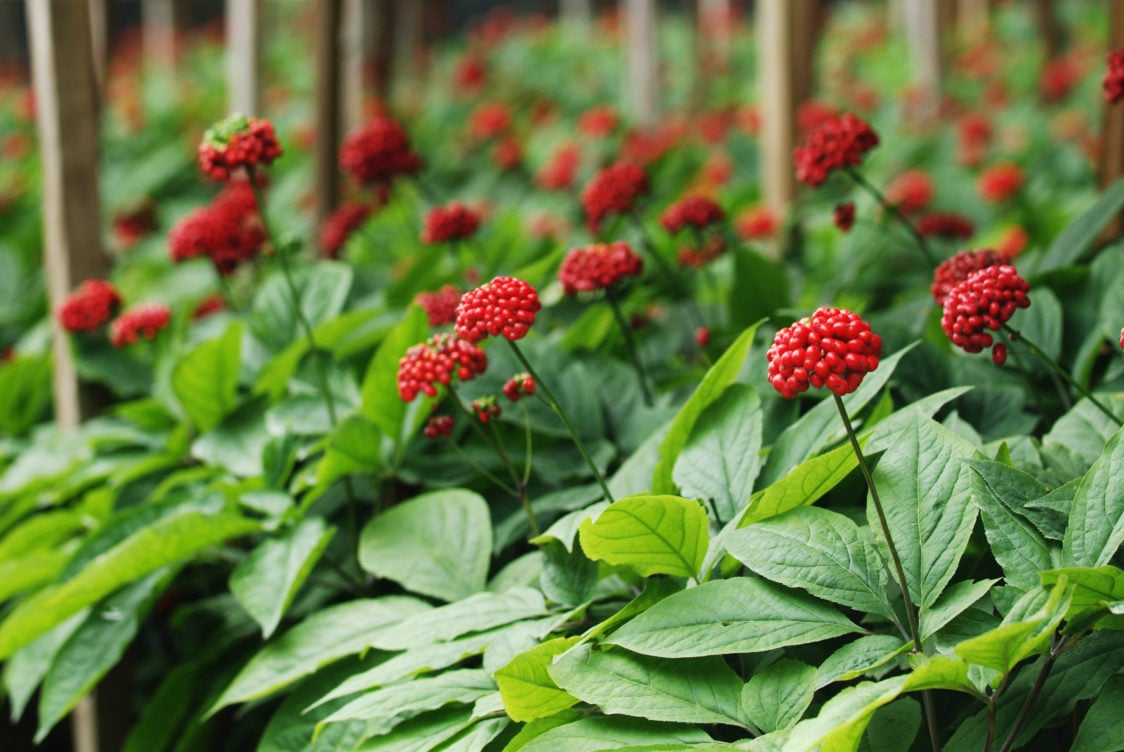
3. Eleutherococcus senticosus promotes athletic performance
Eleutherococcus senticosus, Siberian ginseng or devil’s claw. These are all names for a plant that is a traditional part of Chinese medicine. It has also been used for a long time in the area of Russian Siberia, as evidenced by one of its names. When you see this plant in nature, you probably won’t find anything very interesting about it. But everything changes when you look at what is hidden underground. At that moment, you will understand the name devil’s claw. In the case of eleutherococcus, it really looks like it was created by the devil himself. The extract from the root, but also from the stems and leaves of this plant, is most often used in food supplements. You can then find it in the form of capsules, tablets, teas or tinctures. [12]
Effects of eleutherococcus according to studies
This adaptogen is mostly used to reduce physical fatigue and support long-term sports performance. It is also associated with the support of immune functions and better mental resilience in stressful situations.
Its effect on sports endurance was tested, for example, in a study in which one group of recreational cyclists took 800 mg of this plant extract for 8 weeks and the other group received a placebo. Then they swapped. All participants were tested for athletic performance during the study. An improvement in VO2max indicator, which is essential for endurance performance, has been observed in those taking Eleutherococci. They also had better indicators of heart function and were able to use glycogen (a storage source of energy) more efficiently. [12–14]
Siberian ginseng can also enhance the effects of other adaptogens. It works great, for example, in conjunction with Rhodiola rosea and schisandra. This combination is typically used to better manage stress. Eleutherococcus is thus an ideal adaptogen for all athletes as well as individuals who want to better manage tension and stressful situations. [12–14]
Recommended dosage of eleutherococcus
- The standard dose that has been commonly used in studies is in the range of 300-1200 mg a day.
- However, in some studies, you may encounter a dosage of 2-4 g per day.
- The maximum effect is usually achieved only after a few weeks of regular use. [12]
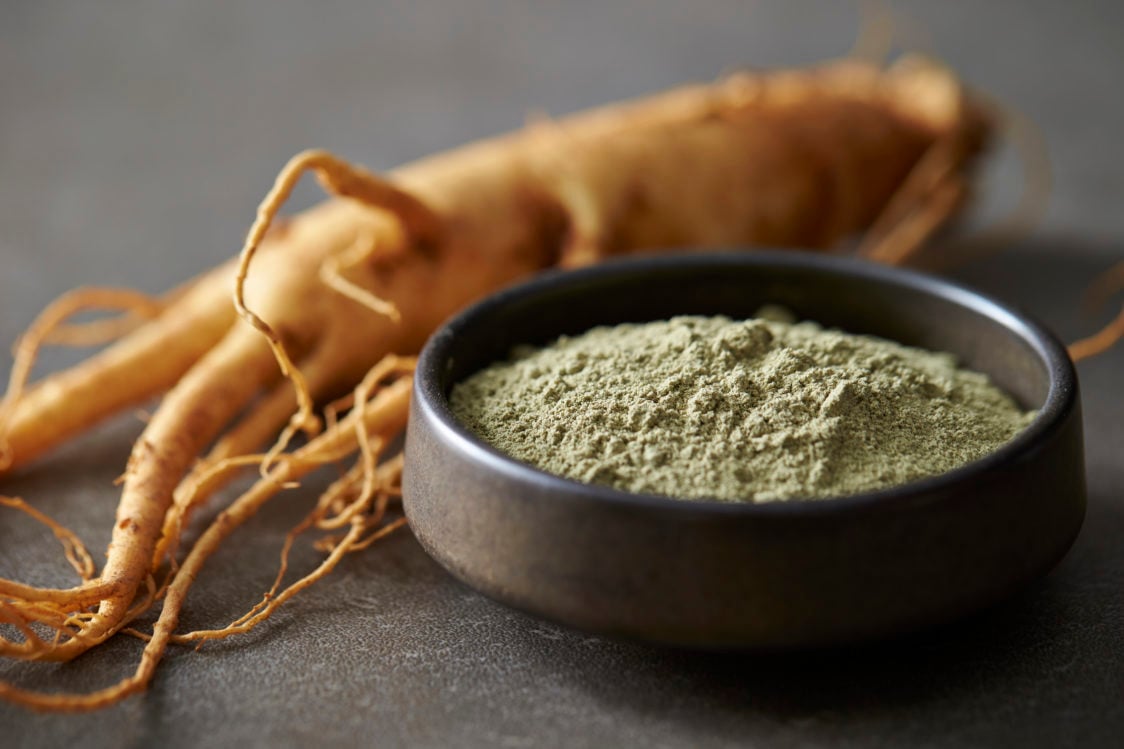
4. Chinese schisandra helps reduce oxidative stress
Chinese schisandra (Schisandra chinensis) or Five-flavour-fruit is a plant that is strongly rooted in Chinese traditional medicine, and local herbalists have known its effects for hundreds of years. In Chinese, its name means the fruit of the five flavours. It is said that when you taste its fruits, you will not be able to decide whether they taste sweet, bitter, sour, hot or salty. Fruits are small, red and resemble cranberries or redcurrants. Although they can be eaten fresh, they are used more to make teas, syrups, or even wine. Their fruit extract is also added to food supplements, which most often take the form of powders or capsules. [15]
Effects of Chinese schisandra according to studies
The main ace up the schisandra’s sleeve is the schisandrins, which are responsible for most of their effects. However, the fruits of this plant also contain polyphenols, flavonoids and vitamins C and E. All these substances are among the antioxidants that protect the body from damage by oxidative stress. Thanks to its adaptogenic properties, schisandra can also help you better manage stress or anxiety and also increase physical performance. [15–16]
In one of the studies, the monitored women were divided into two groups. One was taking a placebo and the other 1000 mg of schisandra extract. The participants showed a change in the strength of the lower limbs and the amount of lactate, which is closely related to muscle fatigue. After 12 weeks, these values were remeasured, and as a result, in women who used schisandra, the researchers observed a higher strength in the lower limbs and a reduction in the amount of lactate in the body. However, neither sports activity nor diet was monitored in these women. So far, it is not entirely clear what is behind the influence of schisandra on sports performance, and further research is needed. Moreover, better blood flow to the muscles can have a certain effect due to higher production of nitric oxide in the body. This effect was observed after the use of schisandra. Schisandra is therefore another herb with adaptogenic properties and can help you to resist stress. In addition, it can improve athletic performance. [15, 17]
Recommended dosage of Chinese schisandra
- Dried and ground schisandra fruit is commonly used in amounts of 1-3 g per day.
- The same dose applies to the capsule form.
- Long-term use of this substance is appropriate to achieve maximum effects. [15]
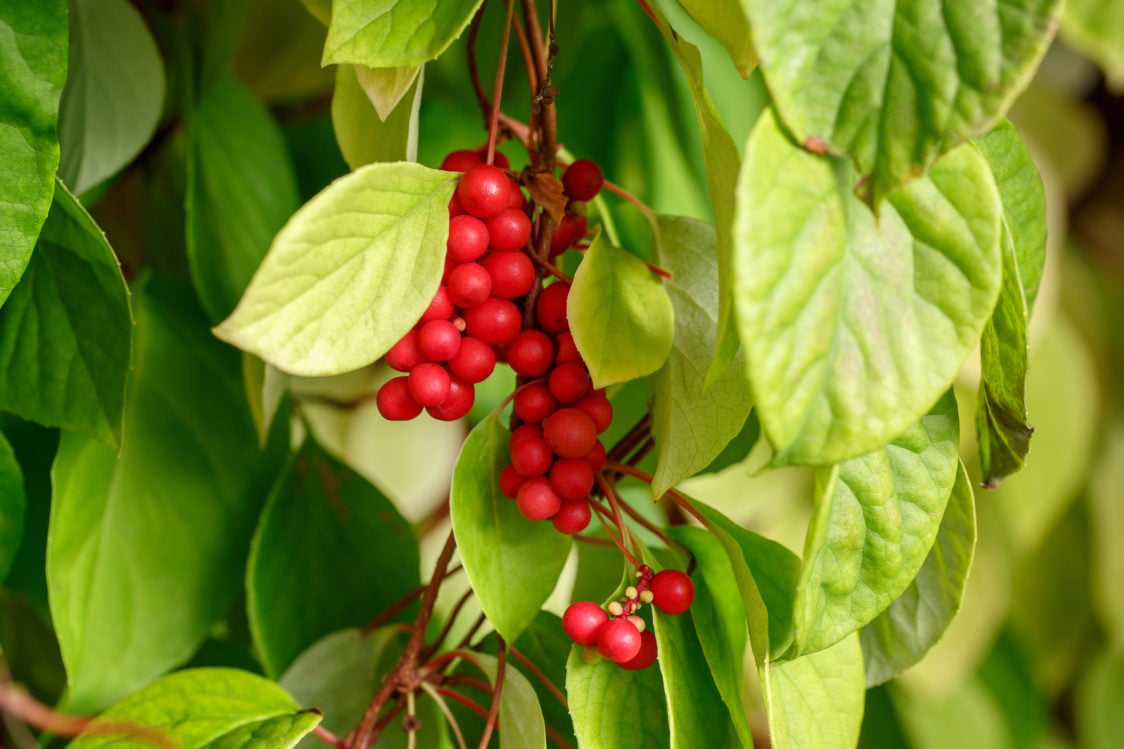
5. Ashwagandha lowers cortisol and helps fight stress
Ashwagandha (Withania somnifera) is called the queen of Ayurvedic herbs. Less magnificent is the translation of the name of this plant from Indian Sanskrit, which translates as the “smell of a horse”. After all, if you smell its roots, it can remind you of the horse smell. But don’t get discouraged. If you decide to try ashwagandha, you will not have to eat the root itself, but you will find it in a more pleasant form of capsules or tablets, which eliminate these inconveniences. [18]
Effects of ashwagandha according to studies
Ashwagandha is one of the best known and most researched adaptogens. According to studies, it has a number of beneficial effects on the human body. These include relieving feelings of anxiety and stress, promoting physical performance or improving cognitive functions such as thinking and memory. In men, it can also help increase testosterone.
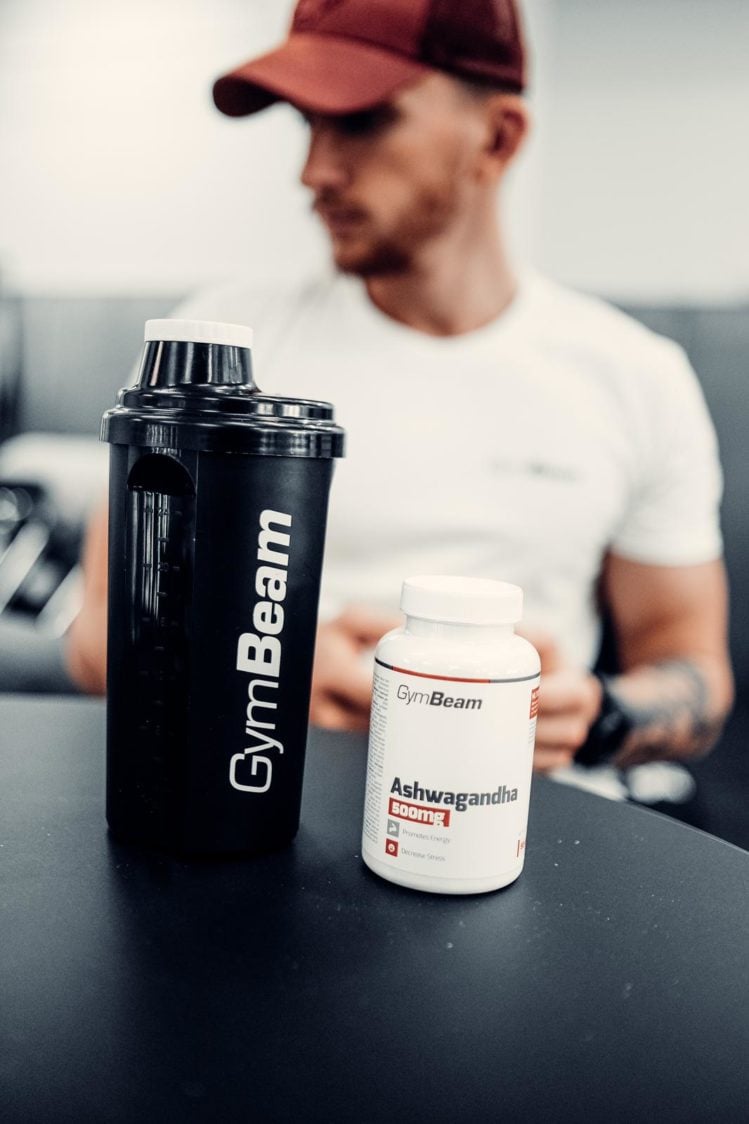
A positive effect on stress management was also demonstrated in a study in which participants took 300 mg of ashwagandha extract twice a day for 60 days. Only people who have experienced chronic stress in the past participated in this study.
Before and after the test period, their stress hormone cortisol levels were taken and they also completed a “stress questionnaire” regarding their perceived stress levels. At the end of the test period, according to the questionnaire, they had 44% lower stress scores and 27.9% lower blood cortisol levels.
Thanks to these results, the researchers concluded that ashwagandha extract can increase an individual’s resistance to stress, and thus improve one’s overall quality of life. [18–19]
Recommened dosage of ashwagandha
- In the studies, the dose of ashwagandha most often ranged from 300 to 500 mg.
- It is not yet clear whether higher doses above 500 mg indicate a stronger effect.
- For maximum effect, ashwagandha is recommended to be used long-term. [20]
In addition to adaptogens, other practical tips can help you manage stress, which you will find in the article Why Is Stress Dangerous and How To Reduce It?
6. The mushroom of immortality “reishi” promotes mental and physical well-being
Reishi (Ganoderma lucidum) is a fungus with a long history of use in traditional Chinese medicine. Just its original name in Chinese, which translates as the mushroom of immortality, raises the desire to learn more about it. Reishi are not eaten like other mushrooms that are added to soups or sauces. It has a bitter taste and a firm consistency. It is definitely more pleasant to use in the form of food supplements. You can find it, for example, in powder, capsules or tablets. [21]
Effects of reishi according to studies
Reishi contains a whole range of active substances that are most associated with the feeling of mental and physical well-being, stress reduction and support of immune functions.
Polysaccharides and terpenoids are considered to be the most effective substances found in reishi. Of the polysaccharides, the most important is beta-glucan. It is a form of soluble fiber, which is beloved by healthy bacteria living in our intestines. Overall, it helps maintain balance in the intestinal microbiome, which is closely linked to healthy digestion, optimal weight and the body’s defences. According to studies, the active substances contained in the reishi mushroom also help to increase the activity of immune cells (natural killer cells), which have antitumor effects. Studies have also confirmed the positive effects of this mushroom extract on the symptoms of chronic mental and physical fatigue. This can include muscle pain, dizziness, sleep disorders, nausea, inability to relax and irritability. Study participants who had some of these symptoms showed relief after 8 weeks of regular use of reishi extract. [21–22]
Recommended dosage of reishi
- Most commonly used amount of reishi in studies ranges between 1.4–5.2 g per day.
- Higher doses have also been examined in studies, but it is not yet clear whether they really have a stronger effect and a greater benefit.
- Like other adaptogens, reishi should be used long-term to achieve desired results. [21–23]
If you are wondering what you can do for strong immunity, read our article 15 Ways to Strengthen Your Immune System and Protect Your Health.
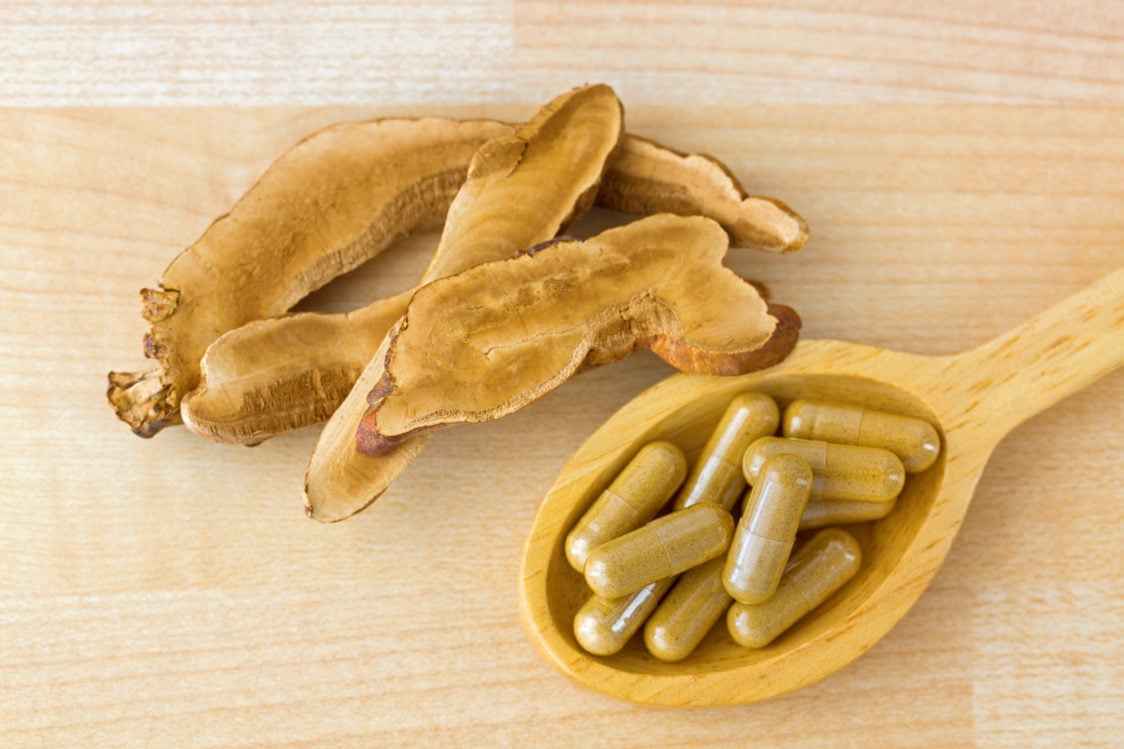
7. Caterpillar fungus promotes health in men and testosterone production
Cordyceps sinensis (Ophiocordyceps sinensis) or caterpillar fungus is, at first glance, an atypical fungus. It grows mainly in Asia and is one of the jewels of traditional Chinese medicine. It didn’t get its name of the caterpillar by accident. It parasitizes on insect larvae, which it gradually completely controls and acquires their shape. Furthermore, it is a rare fungus and its collection in nature is very limited. At one time in Chinese history, it could be enjoyed only at the Imperial Palace. Currently, thanks to modern cultivation techniques, it is much more available and is mainly used for the production of food supplements. [24]
Effects of Caterpillar fungus according to studies
Cordyceps, like reishi, contains polysaccharides in the form of beta-glucans, bioactive cordyceps and other active ingredients that give it unique properties. These are largely due to the fact that this adaptogen is used to promote vitality, improve athletic performance and increase testosterone levels in men.
It also has antioxidant properties, which help neutralize free radicals that could cause damage to the body. According to studies, it can also support sports performance by improving its ability to use oxygen (VO2max), thus helping to delay fatigue. Thanks to the content of beta-glucans, Cordyceps also has a positive effect on maintaining balance in the intestinal microbiome and also contributes to the body’s optimal defences. A number of scientific studies have also shown its effects on normalizing cholesterol levels and overall cardiovascular health. Its effects can also reflect positively on men’s health. According to some studies, it can affect Leydig testicular cells and thus support testosterone production. Cordyceps supplementation can thus have a positive effect on essential areas of human life. [25–27]
Recommended dosage of Cordyceps sinensis
- According to studies, an effective dose is considered to be 1000-3000 mg of Cordyceps extract per day.
- This amount is usually taken in one or more doses with food.
- To achieve the effects of Cordyceps, it is necessary to use it for a long time. [1–2]
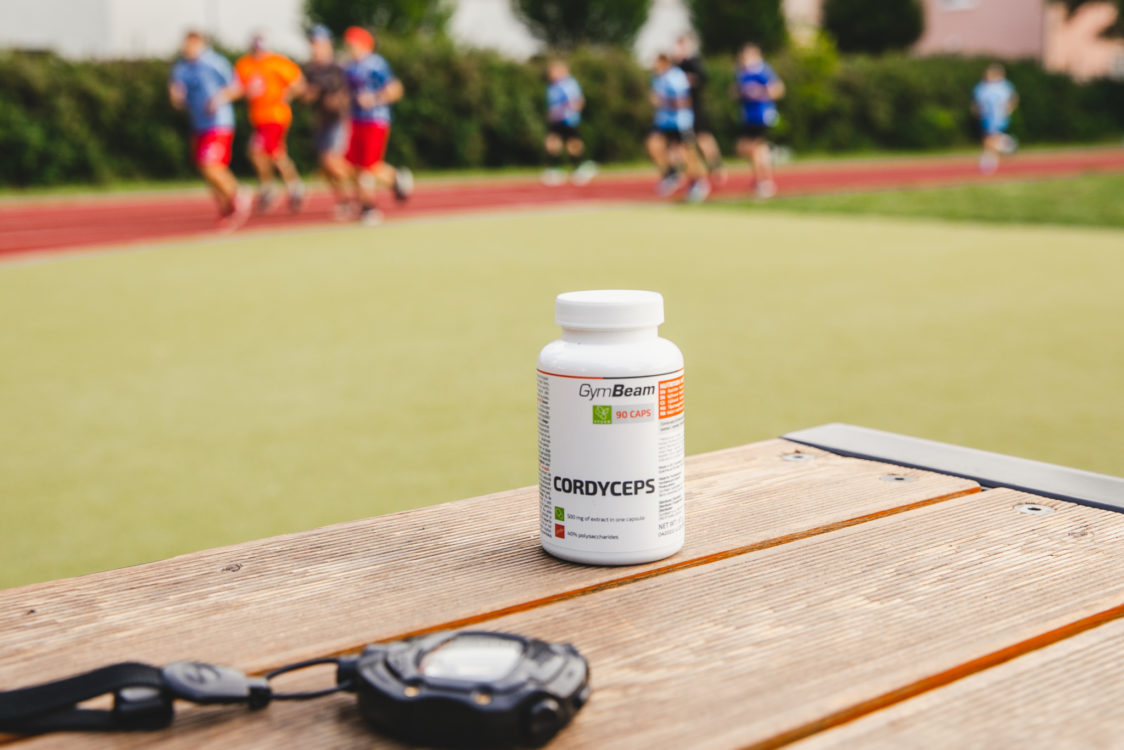
Is it okay to combine different adaptogens?
The effects of adaptogens are often similar and often complement each other perfectly in one dietary supplement. For example, the combination of eleutherococcus with rhodiola and schisandra is scientifically proven. Together, they can help manage stress more effectively. Also, the combination of reishi with Cordyceps and other fungi with adaptogenic properties will create a complex in which the effects of the individual substances support each other.
If you are new to adaptogens, choose one or two products and monitor the reaction of your body. Feel free to write down how you feel daily. If you have more energy, sleep better or feel less stressed. Remember that these substances need to be used for a long time and regularly. It might take a few weeks before any effect can be seen. It is definitely not a good idea to start taking all 7 of these adaptogens at once in full doses. This could cause a number of discomforts, led by nausea or headaches. If you are taking any medications, talk to your doctor about the suitability of taking adaptogens. [4, 29]
What should you remember?
Adaptogens can make it easier for you to cope with everyday life because sometimes you just have to deal with some stress. They affect hormones and can affect the nervous system, making you feel calmer and more resilient. Some of them have qualities that you will appreciate in other areas of life. Rhodiola rosea, for example, helps reduce physical or mental fatigue, eleutherococcus and schisandra can promote athletic performance, and ashwagandha can improve health in men and increase testosterone levels. Reishi and Cordyceps fungi, in turn, can improve the environment of the intestinal microbiome, which is essential for healthy immunity. So, which adaptogen will you try first?
Do you have enthusiastic friends who are always looking for ways to become the best version of themselves? Don’t forget to share our article with them so that they can also learn about the interesting effects of adaptogens.
[1] Adaptogens: A Review of their History, Biological Activity, and Clinical Benefits—American Botanical Council. – https://www.herbalgram.org/resources/herbalgram/issues/90/table-of-contents/feat_adaptogens/
[2] Panossian, A. Understanding adaptogenic activity: Specificity of the pharmacological action of adaptogens and other phytochemicals.– https://doi.org/10.1111/nyas.13399
[3] Ajala, T. The Effects of Adaptogens on the Physical and Psychological Symptoms of Chronic – https://doi.org/10.31922/disc4.2
[4] Acosta, K. Your Guide To Adaptogens. – https://www.forbes.com/health/body/what-are-adaptogens/
[5] Frank, K., Patel, K., Lopez, G., & Willis, B. Rhodiola Rosea Research Analysis. – https://examine.com/supplements/rhodiola-rosea/
[6] Lekomtseva, Y., Zhukova, I., & Wacker, A. Rhodiola rosea in Subjects with Prolonged or Chronic Fatigue Symptoms: Results of an Open-Label Clinical Trial. – https://doi.org/10.1159/000457918
[7] Noreen, E. E., Buckley, J. G., Lewis, S. L., Brandauer, J., & Stuempfle, K. J. The Effects of an Acute Dose of Rhodiola rosea on Endurance Exercise Performance. – https://doi.org/10.1519/JSC.0b013e31825d9799
[8] Kiefer, D. S., & Pantuso, T. Panax ginseng. – https://www.aafp.org/afp/2003/1015/p1539.html
[9] Rokot, N. T., Kairupan, T. S., Cheng, K.-C., Runtuwene, J., Kapantow, N. H., Amitani, M., Morinaga, A., Amitani, H., Asakawa, A., & Inui, A. A Role of Ginseng and Its Constituents in the Treatment of Central Nervous System Disorders. – https://doi.org/10.1155/2016/2614742
[10] Kim, J.-H. Pharmacological and medical applications of Panax ginseng and ginsenosides: A review for use in cardiovascular diseases – https://doi.org/10.1016/j.jgr.2017.10.004
[11] Frank, K., Patel, K., Lopez, G., & Willis, B. Panax ginseng Research Analysis. – https://examine.com/supplements/panax-ginseng/research/
[12] Frank, K., Patel, K., Lopez, G., & Willis, B. Eleutherococcus senticosus Research Analysis. – https://examine.com/supplements/eleutherococcus-senticosus/
[13] Eschbach, L. F., Webster, M. J., Boyd, J. C., McArthur, P. D., & Evetovich, T. K. The effect of siberian ginseng (Eleutherococcus senticosus) on substrate utilization and performance. – https://doi.org/10.1123/ijsnem.10.4.444
[14] Panossian, A., Hamm, R., Kadioglu, O., Wikman, G., & Efferth, T. Synergy and Antagonism of Active Constituents of ADAPT-232 on Transcriptional Level of Metabolic Regulation of Isolated Neuroglial Cells. – https://doi.org/10.3389/fnins.2013.00016
[15] Frank, K., Patel, K., Lopez, G., & Willis, B. Schisandra chinensis Research Analysis. – https://examine.com/supplements/schisandra-chinensis/research/
[16] Szopa, A., Ekiert, R., & Ekiert, H. Current knowledge of Schisandra chinensis (Turcz.) Baill. (Chinese magnolia vine) as a medicinal plant species: A review on the bioactive components, pharmacological properties, analytical and biotechnological studies. – https://doi.org/10.1007/s11101-016-9470-4
[17] Park, J., Han, S., & Park, H. Effect of Schisandra chinensis Extract Supplementation on Quadriceps Muscle Strength and Fatigue in Adult Women: A Randomized, Double-Blind, Placebo-Controlled Trial. International – https://doi.org/10.3390/ijerph17072475
[18] Singh, N., Bhalla, M., de Jager, P., & Gilca, M. An Overview on Ashwagandha: A Rasayana (Rejuvenator) of Ayurveda. – https://doi.org/10.4314/ajtcam.v8i5S.9
[19] Chandrasekhar, K., Kapoor, J., & Anishetty, S. A Prospective, Randomized Double-Blind, Placebo-Controlled Study of Safety and Efficacy of a High-Concentration Full-Spectrum Extract of Ashwagandha Root in Reducing Stress and Anxiety in Adults. – https://doi.org/10.4103/0253-7176.106022
[20] Drugs.Com. Ashwagandha Uses, Benefits & Dosage—Herbal Database. – https://www.drugs.com/npp/ashwagandha.html
[21] Frank, K., Patel, K., Lopez, G., & Willis, B. Ganoderma lucidum Research Analysis. – https://examine.com/supplements/ganoderma-lucidum/
[22] Cao, Y., Xu, X., Liu, S., Huang, L., & Gu, J. Ganoderma: A Cancer Immunotherapy Review. – https://doi.org/10.3389/fphar.2018.01217
[23] Drugs.Com. Reishi Mushroom Uses, Benefits & Dosage—Herbal Database. – https://www.drugs.com/npp/reishi-mushroom.html
[24] Zhang, Y., Li, E., Wang, C., Li, Y., & Liu, X. Ophiocordyceps sinensis, the flagship fungus of China: Terminology, life strategy and ecology. – https://doi.org/10.1080/21501203.2011.654354
[25] Yi, X., Xi-zhen, H., & Jia-shi, Z. Randomized double-blind placebo-controlled clinical trial and assessment of fermentation product of Cordyceps sinensis (Cs-4) in enhancing aerobic capacity and respiratory function of the healthy elderly volunteers. – https://doi.org/10.1007/BF02836405
[26] Samarasinghe, K., & Waisundara, V. Y. Therapeutic Properties and Anti-Lipidemic Activity of Cordyceps. – https://doi.org/10.5772/intechopen.92616
[27] Functional study of Cordyceps sinensis and cordycepin in male reproduction: A review. – https://doi.org/10.1016/j.jfda.2016.10.020
[28] Frank, K., Patel, K., Lopez, G., & Willis, B. Cordyceps Research Analysis. – https://examine.com/supplements/cordyceps/
[29] Liao, L., He, Y., Li, L., Meng, H., Dong, Y., Yi, F., & Xiao, P. A preliminary review of studies on adaptogens: Comparison of their bioactivity in TCM with that of ginseng-like herbs used worldwide. – https://doi.org/10.1186/s13020-018-0214-9


Add a comment